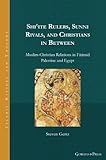Shiʿite Rulers, Sunni Rivals, and Christians in Between : Muslim-Christian Relations in Fāṭimid Palestine and Egypt / Steven Gertz.
Material type: TextSeries: Islamic History and Thought ; 32Publisher: Piscataway, NJ : Gorgias Press, [2023]Copyright date: ©2023Description: 1 online resource (197 p.)Content type:
TextSeries: Islamic History and Thought ; 32Publisher: Piscataway, NJ : Gorgias Press, [2023]Copyright date: ©2023Description: 1 online resource (197 p.)Content type: - 9781463244736
- 9781463244743
- Christianity and other religions -- Islam
- Fatimites -- History
- Islam -- Relations -- Christianity
- Shīʻah -- Relations -- Sunnites
- Shīʻah -- Relations -- Sunnites
- Sunnites -- Relations -- Shīʻah
- Sunnites -- Relations -- Shīʻah
- Egypt
- History
- Middle East
- HISTORY / Middle East / Egypt (see also Ancient / Egypt)
- 297.2/83095694 23/eng/20230413
- BP172
- online - DeGruyter
| Item type | Current library | Call number | URL | Status | Notes | Barcode | |
|---|---|---|---|---|---|---|---|
 eBook
eBook
|
Biblioteca "Angelicum" Pont. Univ. S.Tommaso d'Aquino Nuvola online | online - DeGruyter (Browse shelf(Opens below)) | Online access | Not for loan (Accesso limitato) | Accesso per gli utenti autorizzati / Access for authorized users | (dgr)9781463244743 |
Browsing Biblioteca "Angelicum" Pont. Univ. S.Tommaso d'Aquino shelves, Shelving location: Nuvola online Close shelf browser (Hides shelf browser)
Frontmatter -- TABLE OF CONTENTS -- FOREWORD AND ACKNOWLEDGEMENTS -- CHAPTER 1. INTRODUCTION -- CHAPTER 2. SECTARIANISM AND DHIMMĪS IN THE NAHJ AL-BALĀGHA -- CHAPTER 3. SECTARIANISM AND DHIMMĪS IN THE DAʿĀʾIM AL-ISLĀM -- CHAPTER 4. GOVERNING THE DHIMMĪS IN PALESTINE AND EGYPT: FĀṬIMID PERSPECTIVES -- CHAPTER 5. GOVERNING THE DHIMMĪS IN PALESTINE AND EGYPT: MELKITE PERSPECTIVES -- CHAPTER 6. CONCLUSION -- BIBLIOGRAPHY -- INDEX
restricted access online access with authorization star
http://purl.org/coar/access_right/c_16ec
The study of sectarianism in Islam and the study of Muslim-Christian relations are both sub-specialities attracting growing numbers of scholars in Islamic studies. Rarely, though, are these two fields put into direct conversation with each other. In this work, Steven Gertz brings the two together to ask how the Sunni-Shi'a divide in Islam impacts Muslim relationships with Christians. Do tensions within Islam do more to help Muslim relationships with Christians, or harm them? Gertz goes about answering this through a historical study of the Fatimid caliphate in Palestine and Egypt during the fourth/tenth and fifth/eleventh centuries. He specifically works to understand how Fatimid religious principles (ascertained through the study of law) and politics (ascertained through the study of history) impacted Christians in light of Fatimid-Abbasid rivalry. In the process of doing so, he makes a valuable contribution to the study of Islamic religious identity formation as it concerns sectarianism within Islam and inter-religious relations with non-Muslims.
Mode of access: Internet via World Wide Web.
In English.
Description based on online resource; title from PDF title page (publisher's Web site, viewed 06. Mrz 2024)









